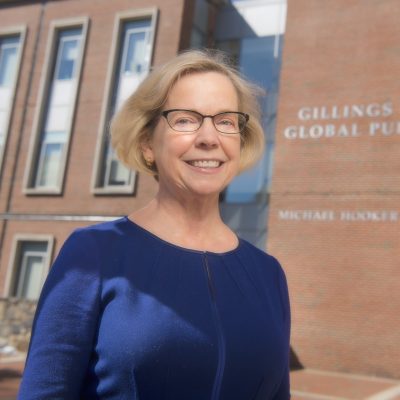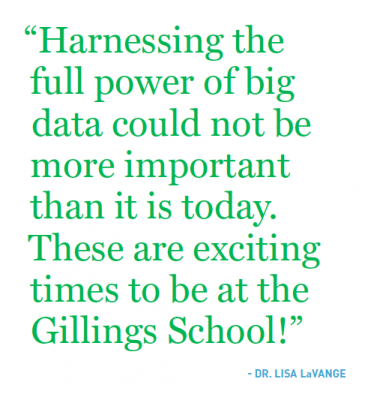Dr. Lisa LaVange
October 8, 2018
A high-impact leader in data science

Lisa LaVange
Lisa LaVange, PhD, who rejoined the Gillings School in January 2018 as biostatistics professor, associate chair and director of the Collaborative Studies Coordinating Center (CSCC), is one of America’s leading biostatisticians. She has a formidable mix of teaching and “real-world” experience.
From 2011 to 2017, she was a senior official at the U.S. Food and Drug Administration (FDA). As director of the Office of Biostatistics in the Center for Drug Evaluation and Research, she had one of the most important jobs in the country – overseeing the analyses of clinical trial data in new drug applications and safety monitoring data on drugs already approved.
“It was a high-impact job, and I had a ball,” she says.
 In previous positions, she worked at RTI International, coordinating clinical trials and analyzing survey data; as vice president of biostatistics at the multinational contract research organization, Quintiles Inc.; and as a vice president overseeing data and statistical operations and participating in strategic planning at Inspire Pharmaceuticals.
In previous positions, she worked at RTI International, coordinating clinical trials and analyzing survey data; as vice president of biostatistics at the multinational contract research organization, Quintiles Inc.; and as a vice president overseeing data and statistical operations and participating in strategic planning at Inspire Pharmaceuticals.
Despite her varied, four-decade career in pharmaceuticals, academia, government and the nonprofit world, LaVange has resided in Chapel Hill more or less continuously since her teens.
“I’ve been based here ever since I came to UNC as a freshman in 1971,” she says. “I never gave up my basketball tickets!”
She earned a doctorate in biostatistics at UNC in 1983 and became an adjunct faculty member in 1989 while working at RTI. From 2005 to 2011, just prior to joining the FDA, she was professor of biostatistics and director of the CSCC, which oversees large clinical trials and population studies. The latter include the Atherosclerosis Risk in Communities Study (see tinyurl.com/ARIC-study), sponsored by the National Heart, Lung and Blood Institute (NHLBI), which has tracked the health of about 16,000 people since 1987, and the NHLBI-sponsored Hispanic Community Health Study/Study of Latinos (HCHS/SOL), the largest longitudinal cohort study conducted to date of Hispanics living in the U.S.
 “By now, we have gigabytes of high-quality data from ARIC and are on our way to amassing similar amounts from HCHS/SOL, with 16,000 cohort members followed since 2010 and now gearing up for their third clinic visit,” LaVange says.
“By now, we have gigabytes of high-quality data from ARIC and are on our way to amassing similar amounts from HCHS/SOL, with 16,000 cohort members followed since 2010 and now gearing up for their third clinic visit,” LaVange says.
Following her recent election as the 2018 president of the American Statistical Association, the largest professional statistical organization in the world, with nearly 20,000 members, she decided to step down from the FDA. She returned to the Gillings School to teach and mentor students – and take on new roles and responsibilities, including “firing up” the School’s data science programs.
LaVange says she is particularly excited to be involved in the data science initiatives at the Gillings School and across campus.
“Harnessing the full power of big data could not be more important than it is today,” she says. “The ability to tailor medicines to patients, for example, is becoming more and more possible, thanks to research being done by Gillings School biostatisticians and other faculty members in data mining and machine learning. We have new, smart tools to tap different data sources in ways we could only imagine a decade ago. These are exciting times to be at the Gillings School!”
—Jim Schnabel
Carolina Public Health is a publication of the University of North Carolina at Chapel Hill Gillings School of Global Public Health. To view previous issues, please visit sph.unc.edu/cph.
